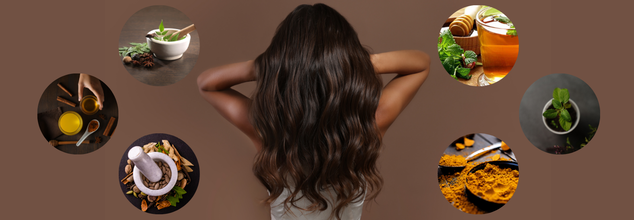
Credit: Canva
From Antiseptic To Laxative: 6 Flowers With Magical Healing Powers
Ayruveda revers flowers beyond their aesthetics. blooms like hibiscus, rose, frangipani etc are often used for their healing and other medicinal powers. Whether infused into teas, applied as herbal pastes, or used in essential oils, Ayurvedic flowers provide holistic healing benefits. From skincare to immunity-boosting remedies, these Indian blooms play a significant role in promoting overall health. Let’s explore their therapeutic properties and ways to integrate them into daily life.
Why Are Flowers Important In Ayurveda?
Flowers help balance the three doshas—Vata, Pitta, and Kapha—to promote holistic health. Floral extracts are widely used in Ayurvedic skincare, hair care, and herbal medicine. Many Ayurvedic formulations incorporate flowers to aid digestion, strengthen immunity, and support longevity. The cooling and soothing properties of certain flowers help alleviate stress, anxiety, and fatigue, making them ideal for daily wellness rituals.Can Flowers Heal You?
Many flowers, like frangipani, hibiscus, etc are revered for their healing powers in Ayurveda and other traditional medicines. Here are 6 flowers that are packed with laxative, antimicrobial and other healing powers.Amaltas (Golden Shower Tree)
This vibrant yellow flower is prized in Ayurveda for its natural laxative properties. It aids digestion, relieves constipation, and supports gut health. Amaltas is also used in Ayurvedic formulations to purify the blood and detoxify the liver.
Hibiscus
Hibiscus, with its deep red petals, is known for promoting hair growth and preventing premature graying. It also benefits heart health by lowering blood pressure and cholesterol. Hibiscus tea is a popular remedy for circulation and skin health.
Lotus
Highly revered in Ayurveda, the sacred lotus flower has cooling and calming effects. It reduces stress, enhances mental clarity, and promotes emotional balance. Lotus extracts are also used in skincare for their hydrating and anti-aging properties.
Giloy Flowers
Giloy, or ‘Amrita,’ is known for its potent immunity-boosting properties. Its flowers help detoxify the body, reduce inflammation, and support longevity. They also aid in fighting respiratory infections and promoting overall wellness.
Frangipani
Frangipani is renowned for its soothing fragrance and therapeutic effects. Used in Ayurvedic aromatherapy, it promotes relaxation, reduces anxiety, and improves sleep quality. Its essential oil is often added to massage oils and bath rituals.
Calendula
Calendula flowers possess strong anti-inflammatory and antiseptic properties. They are frequently used in Ayurvedic skincare to heal wounds, treat acne, and soothe irritated skin. Calendula-infused oils and creams are ideal for sensitive skin.
Jasmine
Jasmine is cherished for its uplifting fragrance and stress-relieving properties. In Ayurveda, jasmine flowers balance emotions, calm the mind, and enhance mood. Jasmine tea and essential oils are widely used to alleviate anxiety and promote relaxation.
Marigold
Marigold, or ‘Genda Phool,’ is a staple in Ayurveda for its antimicrobial and healing properties. It is often used in herbal eye drops to improve vision and reduce inflammation. Marigold extracts also soothe skin irritations and minor wounds.
How To Use Ayurvedic Flowers
Ayurvedic flowers can be seamlessly incorporated into daily routines through various methods:
Inflused Teas
Hibiscus and lotus tea for heart health and relaxationGiloy and amaltas herbal infusions for immunity and detoxification
Floral Hair Masks & Skincare
Hibiscus hair masks for stronger, shinier hair
Calendula face packs for acne-prone skin
Jasmine-infused oils for radiant skin.
Healing Bath Rituals
Frangipani and jasmine-infused bathwater for stress relief
Marigold and lotus petals in warm baths for skin nourishment
DIY Ayurvedic Creations Using Flowers For Health & Wellness
Hibiscus Hair Tonic: Boil hibiscus petals in coconut oil and use as a nourishing hair mask.
Calendula Face Mist: Infuse calendula petals in rose water for a refreshing facial mist.
Jasmine Sleep Spray: Mix jasmine essential oil with water and spritz on pillows for better sleep.
Marigold Eye Compress: Soak marigold petals in warm water and place over tired eyes for instant relief.
Where to Find Fresh Ayurvedic Flowers?
Finding fresh Ayurvedic flowers is easier than ever. Whether you need them for herbal treatments, teas, or skincare, they are readily available at local flower markets in India. Online platforms also offer high-quality blooms for wellness needs, ensuring easy access to nature’s healing wonders.

Image Credit: Canva
Why Ayurveda Says Your Morning Tea Should Do More Than Just Wake You Up
What if your morning tea could do more than just shake off sleep? What if, instead of a quick caffeine fix, it became a ritual—one that aligns your body with nature’s rhythm, fuels your energy, and nurtures your mind?
Ayurveda dictates, mornings aren't simply about waking up; they're about laying the groundwork for the day to come. And what you introduce into your body first matters. Your tea isn't merely a beverage—it's a chance to align your doshas, support your digestion, and welcome clarity into your mind. So, before you grab that sugar-coated, milky mug, let's rethink what your morning tea should actually be doing for you.
As per Ayurveda, dinacharya or daily routine is essential for keeping the body, mind, and spirit in health. Having morning routines not only synchronizes us with nature's rhythm but also helps maintain overall well-being. An Ayurvedic morning routine grounds us for the day ahead, bringing equilibrium between the body's doshas—Vata, Pitta, and Kapha.
Dr. Rohit Sane, an expert in Ayurveda, underscores, "The early morning hours are sacred.". The mind is peaceful, the environment is calm, and the body is spontaneously preparing for the upcoming day. Ayurveda believes that this period, which is called Brahma Muhurta, is an opportunity to harmonize with nature's rhythm." Among the most important Ayurvedic traditions at this moment is beginning the day with a well-selected herbal tea, created to cultivate the body rather than merely waking it up.
In Ayurveda, the various periods of the day are dominated by three doshas:
Vata (2 a.m. - 6 a.m.) – Dominated by air and ether, Vata's energy encourages lightness, creativity, and movement. This is the best time to wake up, cleanse, and practice grounding activities such as meditation and deep breathing.
Kapha (6 a.m. - 10 a.m.) – Earth and water elements predominate, inducing heaviness and lethargy. Waking up after this time can cause drowsiness during the day.
Pitta (10 a.m. - 2 p.m.) – Governed by fire and water, this time increases concentration and productivity, making it the best time for work and solving problems.
Identification of these shifts in energy aids in the organization of a morning regimen that acts harmoniously with the body, not against it.
Why Your Morning Tea Needs To Be More Than Just Caffeine?
While most use customary caffeinated tea and coffee as a starting point for their day, Ayurveda suggests herb teas individualized to the unique dosha. These teas wake up the senses, light up Agni (digestive fire), and revive balance in the body's energies.
Dr. Sane continues, "In contrast to usual tea filled with milk, sugar, and caffeine, Ayurvedic teas employ targeted herbs to balance doshic disarray. The proper tea has the ability to boost digestion, stimulate clarity, and maintain energy without the collapse."
Herbal Tea Blends for Each Dosha
1. Teas for Kapha Dominance
Morning, being Kapha-dominant, has heavy, cool, and slow properties. When unbalanced, these can manifest as sluggishness and lethargy. Ayurvedic teas neutralize this by using warming and stimulating spices.
Best Ingredients:
- Dry ginger
- Black pepper
- Cinnamon
- Tulsi (Holy Basil)
These herbs assist in energizing the body, stimulating digestion, and offering sustained energy levels throughout the day.
2. Teas for Vata Imbalance
Individuals with dominant Vata energy tend to wake up cold, scattered, or anxious. To counteract this, warming and stabilizing herbs are employed.
Best Ingredients:
- Ashwagandha
- Nutmeg
- Licorice
- Cardamom
These herbs create warmth, alleviate stress, and ensure that there is constant energy without overstimulation.
3. Teas for Pitta Dominance
Individuals with a dominant Pitta dosha tend to wake up with a clear mind but can be overheated or cranky. Cooling teas balance excessive heat and avoid mood changes.
Best Ingredients:
- Fennel
- Rose petals
- Mint
- Coriander
These are calm-inducing herbs, easing digestion while cooling the body and clarifying the mind.
Ayurvedic Sutra: Food and Beverages as Medicine
Ayurveda firmly adheres to the principle "Ahara hi param aushadham" or food and drink are the most powerful medicine. A carefully prepared herbal tea, appropriate for one's dosha and season, is not merely a beverage—it's an exercise in self-healing. It boosts ojas (life energy), balances emotions, and aids digestion.
Dr. Sane repeats, "A cup of herbal tea in the morning, selected based on your dosha, is an ancient but effective way to begin the day. It provides clarity, enhances metabolism, and keeps energy levels stable."
How to Add Ayurvedic Teas to Your Lifestyle?
Find Out Your Dosha: Knowing if you are more Vata, Pitta, or Kapha helps in choosing the tea.
Brew with Consciousness: Ayurveda stresses being conscious in every move. Make your morning tea slowly, aware of its medicinal virtues.
Combine with Other Ayurvedic Habits: Follow up your tea with oil pulling, tongue scraping, and breathing exercises for an overall healthy morning routine.
Be Seasonal: Tailor your tea ingredients according to the change in seasons. For instance, winter warming spices and summer cooling herbs.
Morning tea can do more than merely wake you up—it can feed your body, mind, and spirit. The Ayurvedic approach isn't about deprivation but about conscious nourishment, making sure each sip of tea adds to your well-being. So tomorrow morning, ditch the sugar-filled, caffeine-rich brew and try a herbal blend that's specific to you. Your body—and your mind—will thank you for it.

Credit: Canva
Tulsi Plants Around Taj Mahal Have A Special Reason And It's Related To Ayurveda
Did you know why thousands of basil trees were planted around the Taj Mahal? You might not be aware of the reason. Since ancient times, basil has been called the "Queen of Herbs." In India, almost every household used to have a basil plant in their courtyard.
Basil trees were planted around the Taj Mahal to help control pollution. They release oxygen for up to 20 hours a day and protect the ozone layer within just four hours. Additionally, basil can purify the air within a 100-square-foot radius.
Shah Jahan had the iconic tulsi trees planted around the monument. Tulsi is known for its medicinal properties—it can help counteract the side effects of paracetamol and anti-TB medicines. It also reduces DNA damage, inhibits tumor growth, and is beneficial for conditions like asthma and bronchitis.
Here's What Happens To Your Body When You Eat Tulsi Leaves Everyday?
When consumed first thing in the morning, tulsi leaves can provide several health advantages.- Immunity Booster: Tulsi is rich in antioxidants such as vitamin C and eugenol. These compounds help fight free radicals and support the immune system. Daily intake may help the body resist infections and improve overall resilience.
- Detoxification Powerhouse: Tulsi’s natural diuretic qualities help eliminate toxins and excess water. This cleansing effect can support kidney function, purify the blood, and result in clearer skin.
- Digestive Aid: Eating tulsi leaves on an empty stomach may stimulate the production of digestive enzymes. This boosts nutrient absorption and eases digestion, while its anti-inflammatory traits soothe the gut lining and reduce bloating.
- Stress Relief and Mood Enhancement: Tulsi is known for its adaptogenic properties, which help the body manage stress by regulating cortisol levels. This may lead to improved mood, reduced anxiety, and a greater sense of calm.
- Respiratory Support: Used traditionally for coughs, colds, and asthma, tulsi’s antimicrobial and anti-inflammatory effects support respiratory health and relieve airway discomfort.
- Blood Sugar Regulation: Some studies indicate that tulsi can help manage blood sugar by enhancing insulin sensitivity and glucose metabolism, potentially aiding those with diabetes or prediabetes.

7 Ayurvedic Hair Health Tips You Should Try For Healthy Locks
Indian hair care has a long history of using natural methods taken from Ayurveda. Most South Asian mothers and grandmothers use oily, herbal massages on their children's heads, followed by washing with natural cleansers like reetha, which comes from soapnuts. These practices are based on Ayurveda and stories from Hindu mythology, which focus on keeping hair healthy with natural remedies. Old texts even suggest that gods and goddesses with balanced personalities had beautiful hair, showing a connection between inner peace and outer beauty.
Practices like adding turmeric and medicinal roots like ginger to our diet, using herbal remedies to build our immunity like eating Tulsi etc.
These practices and learning may seem daunting at first, but you should not worry. Start slow and build your health from there. Flipping your daily routine on its head to practice healthier choices may seem like the best option, but it is better to ease into these practices.
Ayurvedic Tips To Improve Hair Health
While Ayurveda focuses on natural healing and healthy practices, it is always a good practice to do safety checks before you add anything new to your care routine. Patch test before using any new herbal product. One should also beware of potential allergies and side effects. Herbal remedies should be used as a part of a wider healthy lifestyle, make sure you focus on taking care of overall health.
Holistic Approach
Ayurvedic hair care looks at your whole self, not just your hair. It believes your mind, feelings, and food all play a role. It tries to fix the real reasons behind hair trouble, instead of just covering up the symptoms. This way, your hair gets better from the inside out.
Mental and Emotional Health
Feeling stressed or upset can change your hormones, and this can affect your hair. Keeping your mind calm and happy is very important for healthy hair. When you manage stress, your body works better, and your hair grows stronger.
Nutrition
Eating the right foods helps your hair grow. Ayurveda suggests eating fruits and vegetables that fit your body type. Adding healthy fats, like nuts, is good too. Spices like cumin and ginger help your body use food better. Herbal pills like Triphala can balance your body.
Hair Oiling and Washing
Putting oil on your hair feeds your hair roots and scalp. Different oils, like almond, coconut, or olive, work best for different people. Washing your hair with gentle, natural shampoos keeps it clean without drying it out. This makes your hair stronger and healthier.
Scalp Massage
Rubbing your scalp helps blood flow to your hair roots, which makes your hair grow. Warm oil massages are especially good. They make your scalp feel good and help the oil soak in. This keeps your hair and scalp healthy.
Herbal Hair Care
Natural cleansers from plants, like reetha and shikakai, clean your hair gently. Using masks, rinses, and teas with herbs like amla, neem, and hibiscus can help your hair grow and stay healthy. Smelling good oils can also help you relax, which is good for your hair.
© 2024 Bennett, Coleman & Company Limited

